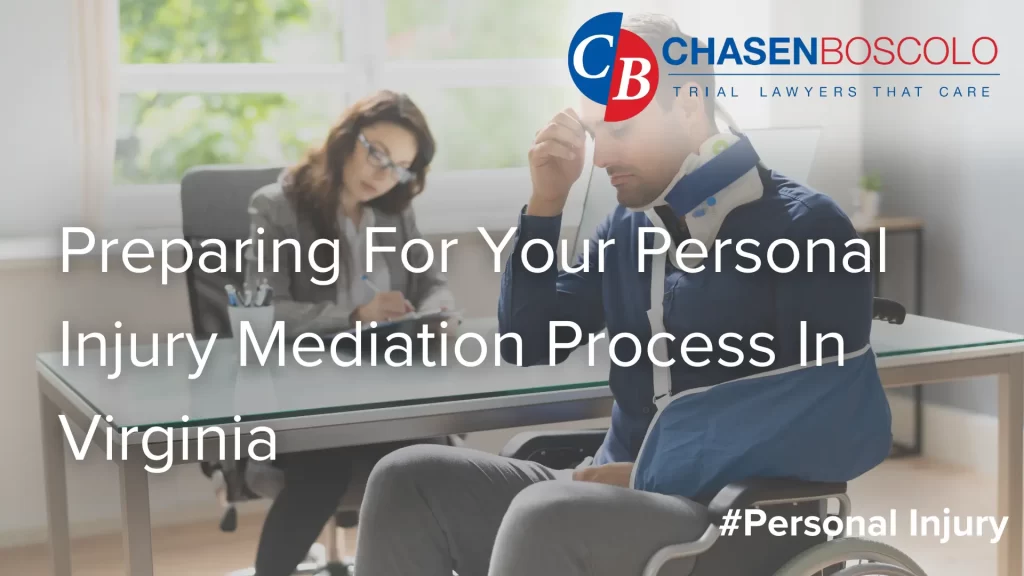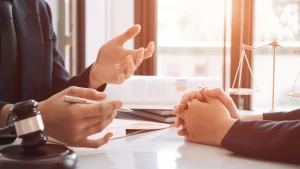Feb 23, 2024 | CHASENBOSCOLO

If you’ve suffered an injury due to someone else’s negligence, you may be considering legal action to seek compensation for your losses. In Virginia, many personal injury cases undergo a mediation process before trial. Mediation is an alternative dispute resolution that aims to help each party reach a mutually agreeable settlement without a lengthy and expensive court battle. What should you do before, during, and after personal injury mediation preparation?
As a personal injury victim, understanding how the mediation process works and preparing accordingly can significantly impact the outcome of your case going to trial. In this blog post, we’ll guide you through the steps of personal injury mediation and provide valuable tips to help you achieve a successful resolution.
Understanding the Mediation Process
Mediation is a voluntary, confidential process in which an unbiased and neutral third party, known as a mediator, facilitates negotiations between the injured party (the plaintiff) and the at-fault party (the defendant) or their insurance company. The mediator’s role is to assist both sides in communicating effectively, identifying areas of agreement, and discussing potential solutions. Unlike a judge or jury, the mediator will never make a binding decision; instead, they help each party reach a mutually agreeable settlement. How does mediation work?
Steps in the Mediation Process for Injury Cases
What steps should follow before, during, and after personal injury mediation preparation? Follow these steps during your mediation process:
- Selecting a Mediator: Both parties involved must agree on a mediator. They can choose from a group of certified mediators or rely on recommendations from their attorneys.
- Scheduling the Mediation: Once a mediator is selected, a date, time, and location for the mediation session are set.
- Submitting Pre-Mediation Statements: Before the mediation, each side typically submits a written statement outlining their position, the facts of the case, and any supporting evidence.
- Opening Statements: At the start of the mediation, each side presents a brief opening statement summarizing their case and goals for the session.
- Private Caucuses: The mediator meets separately with each party to discuss their positions, concerns, and potential settlement options.
- Negotiations: The mediator facilitates negotiations between the parties, helping them find common ground and work towards a resolution.
- Reaching a Settlement: If agreement is reached by the parties, the mediator will assist in drafting a written settlement agreement, which both sides will sign.
- Impasse and Proceeding to Trial: What happens after a mediation settlement? If the parties cannot settle, the case will likely proceed to a personal injury trial.
How to Prepare for Injury Mediation
Thorough preparation is key to a successful mediation outcome. Here are some steps you can take to prepare:
- Gather Evidence: Compile all relevant evidence, including medical records, witness statements, photographs, and expert reports.
- Know Your Case: Review the facts of your case, the evidence you’ve gathered, and any applicable laws or precedents.
- Determine Your Goals: Identify your priorities and what you hope to achieve through mediation. Be prepared to articulate your needs and desired outcomes.
- Assess Strengths and Weaknesses: Objectively evaluate your case’s strengths and weaknesses. Anticipate the other side’s arguments and be prepared to address them.
- Consult with Your Attorney: Work closely with your personal injury attorney to develop a mediation strategy and discuss potential settlement amount ranges.
- Prepare Your Opening Statement: Your opening statement should be concise and persuasive, highlighting the key points of your case.
- Be Open to Compromise: Mediation is about finding a mutually acceptable solution. Be willing to listen to the other side’s perspective and consider compromises that align with your goals.
Tips for Successful Personal Injury Mediation
- Be Professional: Maintain a calm and professional demeanor throughout the mediation, even if emotions run high.
- Listen Actively: Listen to what the other side says and try to understand their perspective. Active listening can help identify areas of agreement and potential solutions.
- Use the Mediator’s Expertise: The mediator is there to help you reach a resolution. Take advantage of their experience and impartiality to explore creative solutions and break through impasses.
- Be Patient: Mediation can be a lengthy process, and progress may sometimes feel slow. Stay patient and trust the process.
- Know Your Bottom Line: While being open to compromise is important, knowing your bottom line and when to walk away is equally important.
- Focus on Your Interests: Rather than getting bogged down in positions, focus on your underlying interests and needs. This can help you find common ground with the other side.
- Be Realistic: Evaluate settlement offers objectively and realistically. If the offer is not up to your standards, it may not be a good idea to accept low-ball offers. Consider the risks and costs of proceeding to trial and weigh them against the proposed settlement.
The Role of Your Personal Injury Attorney
 Your personal injury attorney plays a crucial role in the mediation process. They will:
Your personal injury attorney plays a crucial role in the mediation process. They will:
- Help you prepare for mediation by gathering evidence, assessing your case, and developing a negotiation strategy.
- Represent your interests during the mediation session, advocating for your rights and needs.
- Advise you on the strengths and weaknesses of your case and provide guidance on settlement offers.
- Draft and review any settlement agreements to protect your rights.
If you’re considering mediation for your personal injury case in Virginia, it’s essential to work with a seasoned personal injury attorney who can assist you through the process and fight for the compensation you deserve.
How CHASENBOSCOLO Can Help
Still unsure what should you do before, during, and after personal injury mediation preparation? At CHASENBOSCOLO, we understand personal injury victims’ physical, emotional, and financial challenges. Our compassionate and skilled Virginia personal injury attorneys have decades of experience representing clients in mediation and, if necessary, at trial. We take the time to listen to your story, understand your unique needs, and develop a personalized legal strategy to help you achieve the best possible outcome.
If someone else’s negligence left you with injuries, don’t hesitate to contact us at (301) 220-0050 for a free, no-obligation consultation. We’ll review your case, answer your questions, and guide the next steps. With our No Fee Guarantee®, you won’t pay any fees unless we win your case.
Mediation can be an effective way to come to a resolution in your personal injury claim in Virginia, offering an expedited and less expensive alternative to a trial. Understanding the mediation process, preparing thoroughly, and working closely with an experienced personal injury lawyer can increase your chances of reaching a agreement that meets your needs. Remember, the team at CHASENBOSCOLO is here to support you every step of the way and fight for the justice you deserve. Contact us today to learn more about how we can help you navigate the personal injury mediation process.
Related Posts:
How Long Does Mediation Take in a Lawsuit?
Can You Sue for Emotional Distress in Fairfax, Virginia?
Settle or Litigate? Deciding How to Handle Your Car Accident Claim





